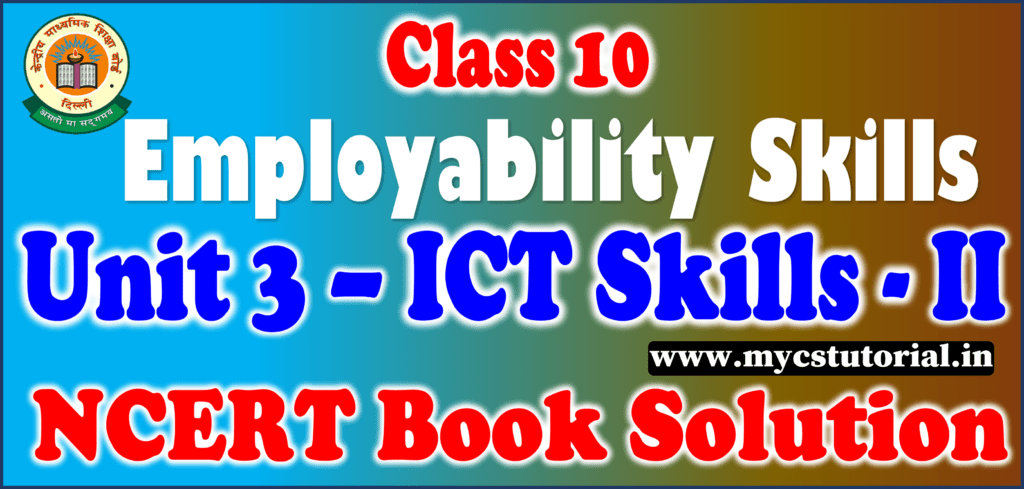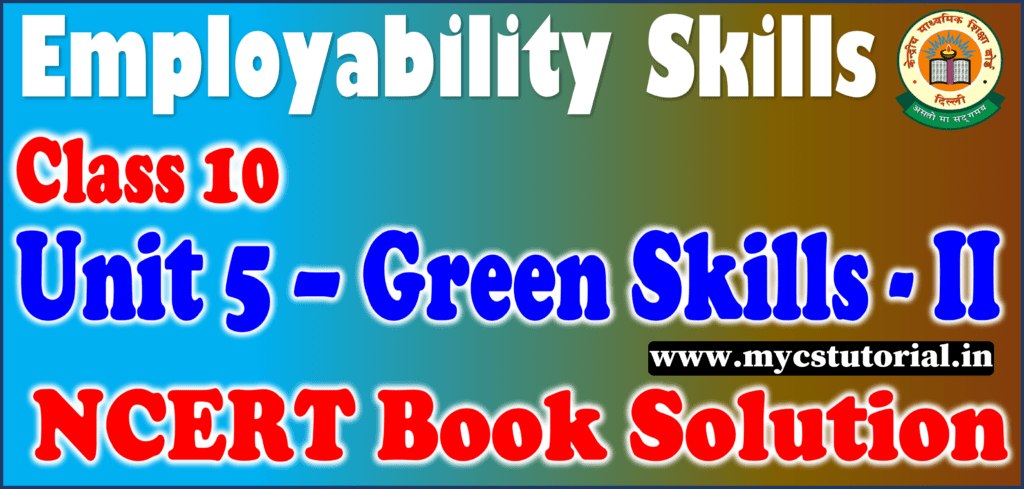Class 10 Employability Skills
Unit 2 Self-Management Skills II NCERT Book Solution
Session 1: Basics of Self-management
Check Your Progress
A. Subjective questions
Que 1 Describe stress and stress management in your own words.
Answer: Stress is our emotional, mental, physical, and social reaction to perceived demands or threats. These demands or threats are called stressors. Stressors are the reason for stress.
Stress Management:
Managing stress is about making a plan to be able to cope effectively with daily pressures. The ultimate goal is to balance life, work, relationships, relaxation, and fun.
Always keep in mind the ABC of stress management
A: Adversity or the stressful event
B: Beliefs or the way you respond to the event
C: Consequences or actions and outcomes of the event
Que 2. List your favorite stress management technique and elaborate why you find it the most effective.
Answer: Self Management Techniques are-
- Time Management
- Physical exercise and fresh air
- Healthy diet
- Positivity
- Organising academic life; no delaying
- Sleep
- Holidays with family and friends
All stress management techniques are very effective and useful. Physical exercise and Fresh air is the most favorable technique because Stress is generally lower in people who maintain a healthy routine. Doing yoga, meditation, and deep breathing exercises help in proper blood circulation and relaxes the body. Even taking a walk or playing in the park will help you get a lot of fresh oxygen, which will help you become more active.
Session 3: Self-Motivation
Check Your Progress
A. Multiple-choice questions
Read the questions carefully and circle the letter(s) (a), (b), (c) or (d) that best answers the question.
1. What makes you complete work or studies without others cheering you?
(a) Self-confidence
(b) Communication
(c) Self-motivation
(d) Self-esteem
Answer: (c) Self-motivation
2. Which of the following are types of motivation?
(a) Internal
(b) Intermediate
(c) External
(d) Extensive
Answer: (a) Internal and (c) External
3. Ravi works hard to get the best student award at the end of year. What type of motivation is this?
(a) Internal
(b) External
(c) Both internal and external
(d) Not any specific type of motivation
Answer: (b) External
Session 4: Self-Regulation Goal Setting
Check Your Progress
A. Subjective questions
Que 1. What is Goal Setting?
Answer: Goals are a set of dreams with a deadline to get them, for example, saving pocket money to buy a favourite mobile phone by a particular date
Goal Setting: Goal is all about finding and listing yourgoals and then planning on how to achieve them.
Goal setting is a very essential factor in your personal life. The process of goal setting in your life helps you decide on how to live your life, where you want to be, and how you want to be in the future.
Que 2. In SMART goals, what does ‘S’ stand for? Explain.
Answer: SMART stands for Specific Measurable Achievable Realistic Time bound
S means Specific: A specific and clear goal answers six questions. Who is involved in the goal? What do I want to do? Where do I start? When do I start and finish? Which means do I use? Why am I doing this?
Que 3. What is the best way to work on long-term goals?
Answer: The best way to work on long-term goals is to breaking down big goals into smaller parts, which make the goal achievable.
Session 5: Self-Regulation – Time Management
Check Your Progress
A. Subjective questions
Que 1. What is time management and how can you manage your time?
Answer: Time management is the ability to plan and control how you spend the hours of your day well and do all that you want to do. An example of good time management skills would be when you decide to finish your homework immediately after school so you have time to watch TV later in the evening.
Que 2. How can tracking your time help you?
Answer: We identify and note where we have spent our time. This will help us analyse if we have used our time effectively or not. It also helps us to identify time-wasting activities.
By Anjeev Kr Singh – Computer Science Educator
Published on : May 9, 2023 | Updated on : August 25, 2023







